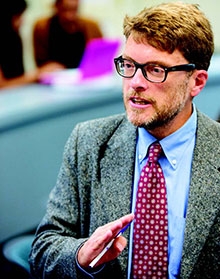The View From Segal: The Mission of MIIS—in Action
| by Jeff Dayton-Johnson

The phrase “mission-driven organization” should give you pause—while plenty of organizations are eager to present themselves in an altruistic light, few actually deliver on that promise. We work hard to put our mission into action at the Institute.
Through programs such as Frontier Market Scouts and Ambassador Corps, our Center for Social Impact Learning trains and supports students who identify budding entrepreneurs in developing economies and connect them with the capital they need in order to scale up their businesses. These programs draw on the Institute’s expertise in areas including business, development, language, and intercultural communication to create tangible social impact, spurring economic growth and changing lives in the process.
Programs like these also offer our students the opportunity to make a difference before they even graduate. Real-world, hands-on experiential learning is a fundamental part of our organizational character and identity. Our students don’t sit in a classroom sketching out a business plan for an imaginary sustainable business; they go to Kenya or Peru or India—and to Silicon Valley and Singapore—where they work with real-life local entrepreneurs.
I really believe that students today, like those at the Institute, are going to be the ones who make the world a better place.
Our spring Commencement speaker, Sakena Yacoobi, who is a member of the Center for Social Impact Learning’s advisory council, has said, “I really believe that students today, like those at the Institute, are going to be the ones who make the world a better place.” Sakena founded the Afghan Institute of Learning (ail) in 1995 to provide training, education, and health care to the Afghan people, with a particular focus on women and children. In the process of living out its organizational mission, ail has grown into one of the largest nonprofit organizations in Afghanistan, providing education and health-care services for more than 12 million people. In 2005, Sakena was among a large group of remarkable women leaders who were jointly nominated for the Nobel Peace Prize.
Sakena’s story epitomizes the hopes and dreams of many of the Institute’s students, alumni, faculty, and staff. We want to do meaningful work that has a positive impact on the world around us. Whether we work in a comfortable office in a city or a simple clinic at the end of a dirt road thousands of miles from Monterey, we want our work to matter—and that’s why leaders like Sakena Yacoobi are often drawn to Monterey. We understand one another in a profound and fundamental way. The missions of our organizations aren’t just empty slogans to be filed away until the next annual report—they are authentic representations of how we want to spend our lives.
For More Information
Eva Gudbergsdottir
evag@middlebury.edu
831-647-6606
